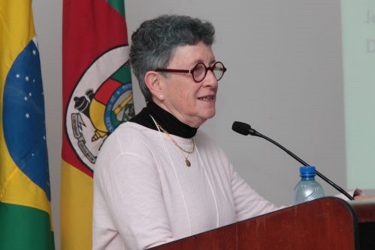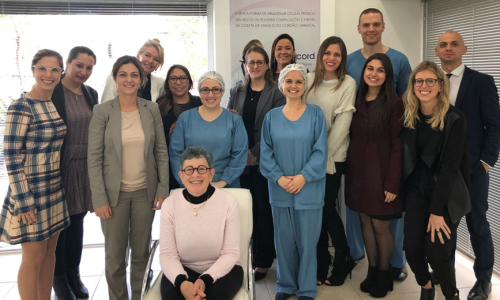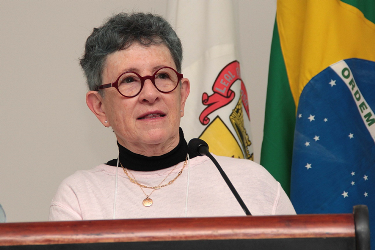Jesteś tutaj
World expert on umbilical cord blood transplantation speaks for the first time in Rio Grande do Sul, Brazil
The physician and researcher from North Carolina - USA , Dr. Joanne Kurtzberg, came to Porto Alegre (state of Rio Grande do Sul - Brazil) for the first time. She was invited to give a talk at the XXI Gaucho Congress of Gynecology and Obstetrics, at Plaza São Rafael Hotel.
Dr. Kurtzberg is an expert in pediatric oncology and hematology, pediatric blood and marrow transplantation, umbilical cord blood banking and transplantation, and an expert in novel applications of umbilical cord cells in the emerging fields of cellular therapy and regenerative medicine.
During the conference, Dr Kurtzberg talked about the advances related to umbilical cord blood transplantation in the last three decades. She presented several success cases in pediatric patients with hematological and metabolic diseases.
The specialist also addressed studies she has published on the use of cord blood in children with cerebral palsy and autism. She presented videos and results from the research, and showed the improvement in quality of life and the evolution in different motor skills and behavioral aspects in treated patients.
Dr. Kurtzberg's research continues to progress. She estimates that in approximately a year there will be published results that will be able to show if cord blood therapy is effective in autism.
 Optimistically, she believes that within two to five years, cord blood may play an important role in many regenerative therapies, including brain injury. The specialist works with the USA Food and Drug Administration (FDA) for the development of the phase 3 clinical trial for cerebral palsy.
Optimistically, she believes that within two to five years, cord blood may play an important role in many regenerative therapies, including brain injury. The specialist works with the USA Food and Drug Administration (FDA) for the development of the phase 3 clinical trial for cerebral palsy.
Considered a viable source of hematopoietic stem cells and more immature white blood cells, cord blood is approved by ANVISA in Brazil and by the FDA in the USA for use in bone marrow transplantation, as part of the treatment for approximately 80 diseases, including leukemias, lymphomas, severe anemias, metabolic disorders, immunodeficiencies and solid tumors.
Cord blood and cord tissue collection are performed by trained practitioners from umbilical cord banks. The procedure is done soon after birth, and is safe, painless and with no risks to the mother and the newborn. The collected material is frozen, stored and is available for immediate or future use as needed.
In three decades, more than 40,000 cord blood transplants have been performed worldwide, and more than 4 million units have been stored in umbilical cord blood banks. To date, more than 200 cord blood units from Brazilian public and private banks have been used in transplants.
Treatment
Dr. Kurtzberg participated in the first cord blood transplant in 1988, performed in her patient: Matthew, a young boy diagnosed with Fanconi's anemia and bone marrow failure. The cord blood used in the transplant was collected at the birth of his baby sister, and stored in the USA. The transplant occurred at Saint-Louis Hospital in Paris, and was coordinated by Dr. Eliane Gluckman. Matthew was effectively cured and is currently leading a normal and healthy life.
In 2010 she created the Robertson Clinical and Translational Therapy Program at Duke University. Dr. Kurtzberg is dedicated to the study and development of new therapies derived from cord blood and cord tissue for the treatment of non-hematological diseases.
In Brazil, the first cord blood transplant was an allogeneic transplant - the patient receives cells from another person - performed in 1997 at Israelita Albert Einstein Hospital in São Paulo. Two years later, the same institution pioneered the world’s first autologous cord blood transplant - the patient receives his own cells. The treatment was performed on a 4-year-old girl with neuroblastoma, a solid tumor originating from the nervous system.
Cord blood transplantation is safe and offers benefits to patients, including equal or greater probability of survival after the procedure, and smaller chance of rejection and relapse of the disease, compared to bone marrow transplantation.
Research results from Dr. Joanne Kurtzberg are influencing the USA regulatory agency FDA for approval of new cord blood treatments within the next few years.
Footnote: SOGIRGS & Hemocord

The Gaucho Congress of Gynecology and Obstetrics is a regional event organized by the Association of Obstetrics and Gynecology of Rio Grande do Sul (SOGIRGS). The Congress aims to disseminate the latest research, advances and innovations in the development of science and technology in the area of Gynecology and Obstetrics, enabling the exchange between researchers, students and other professionals in the field, disseminating and expanding knowledge.
After the Congress, Dr. Kurtzberg visited Hemocord - Stem Cell Bank. The Hemocord team felt extremely honored and privileged to receive Dr. Kurtzberg. It was an important moment for exchange of knowledge, where the CEO of Hemocord, Dr. Karolyn Sassi Ogliari, discussed laboratory and research protocols with Dr. Kurtzberg.
Hemocord is a family bank located in the state of Rio Grande do Sul - Brazil, with services specialized in collection, cryopreservation and storage of umbilical cord blood and tissue. Among its founders is Dr. Karolyn Sassi Ogliari, physician and CEO of Hemocord, who has years of experience in obstetrics and fertilization. She has PhD in Pathology from the University of São Paulo, and postdoctoral degree in Neuroscience at the Harvard Cell Stem Institute. The Medical Director of Hemocord, Dr. Gustavo Brandão Fischer, is a hematologist specialized in cord blood transplantation, and performed his Fellowship at the Saint Louis Hospital in Paris, where the first cord blood transplant took place, with Dr. Eliane Gluckman.



 An attentive audience watched the lecture "Thirty Years of Umbilical Cord Blood Collection and Use - What Evolved?" on Friday morning, 3 August 2018, by one of the world's greatest names on the subject, Dr. Joanne Kurtzberg. (Credit: Fernando Teixeira)
An attentive audience watched the lecture "Thirty Years of Umbilical Cord Blood Collection and Use - What Evolved?" on Friday morning, 3 August 2018, by one of the world's greatest names on the subject, Dr. Joanne Kurtzberg. (Credit: Fernando Teixeira) World's first cord blood transplant patient Matthew, as a child and as an adult
World's first cord blood transplant patient Matthew, as a child and as an adult